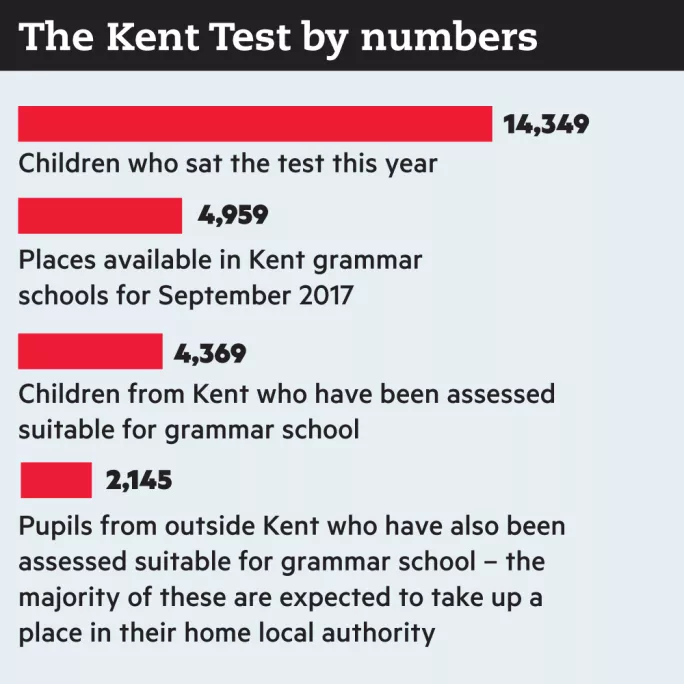A peek behind the curtain to the future of selection

In his 27 years working at St Stephen’s Junior School in Canterbury, Kent, headteacher Stuart Pywell has never had a parent quiz him about Sats scores.
“They ask how many children go to grammar school,” Mr Pywell said. “Sats scores are important for us, but because of the Kent Test [the name for the 11-plus in the county] there is not the same drive, not the same enthusiasm from parents.”
Parents around the country had until this week to submit secondary school application forms for their children. It is a tense time for most families. But in selective areas, such as Kent, the pressure is of a different kind.
“In other areas, you are just choosing a school, which might or might not pick you in some way,” said Sarah Heaney, head of Year 6, when TES visited St Stephen’s the day after pupils received their test results.
“Children here have an element of agency. Their performance is the reason why [they are picked or not]. It’s on their shoulders.”
Finding the ‘best fit’
One man who feels a lot on his shoulders is the head himself. Mr Pywell’s son, Henry, who attends the school, took the test this year, hoping to follow his two siblings to the local grammar.
“If [Henry] goes to a grammar school, then parents think, ‘Well, it’s OK for him, he’s the headteacher’s son’,” Mr Pywell said. But if he hasn’t got a place then people will think, ‘He can’t be a good teacher if his own child isn’t going to a grammar school.’ ”
In the end, Henry was one of 53 pupils at the school who passed. In total, 78 of the 100 Year 6 pupils at the school took the Kent Test.
Children are not required to take the 11-plus, but the impact of failure cannot be avoided in the school. Ms Heaney said they hold an assembly where staff talk about fitting shoes - the analogy being that it is not about the “best” shoe but finding a shoe that fits you.
It is a viewpoint that the government appears to want parents to adopt. Last week, education secretary Justine Greening told TES that university technical colleges (UTCs) were a “good option” for students who were more suited to a “technical education-based route” (“Greening backs UTCs as non-grammar alternative”, 28 October).

But do parents agree? While the school runs cognitive abilities tests in Year 5 to give parents an idea of how their children might fare the following year, they also stress that “advice is only advice” and those with low scores may still want to take the 11-plus to get a shot at a grammar place.
Schools are forbidden from coaching for the Kent Test, but this doesn’t stop parents doing so. And one of the main criticisms of grammar schools is that they skew the system because children’s chances rest on their parents’ ability to afford a tutor.
But Theresa May, who has pledged to increase the number of grammar schools, has said that a non-selective system also favours wealthier families through “selection by house price”. She sees a new-style grammars as a way for children from poorer households to get into top-performing schools.
Mr Pywell described himself as “not against” the grammar school system. He sees grammar schools as one vehicle for providing a curriculum that is tailored to academic children - both rich and poor.
“If you are a parent with academic children, they have more opportunity to do better in a grammar school than a high school,” he said.
On the walls of Mr Pywell’s office are pictures of him on the school’s skiing trip to Italy - an unusual residential for a primary. The school also offers dance lessons to all children, runs its Year 6 leavers’ production in the local theatre and has a multitude of sports and music opportunities.
But on the day after the Kent Test results, success is much more narrowly defined.
Freya, 10, said: “I was really nervous in case my friends passed but I didn’t. I practised exam papers with my parents four times a week in the summer holidays.”
“My mum told me I passed, we went for a treat. We had a McDonald’s. But two of my friends didn’t pass. I felt upset they were not going to grammar school. I am trying not to think about that.”
Noa, 10, was told she was suitable for a high school, rather than a grammar. “I didn’t mind at the beginning but later on I got really upset because I wanted to be with my friends,” she said. “They had made a group chat on Instagram and were all saying they had passed. I was quite sad about it.”
You need a Tes subscription to read this article
Subscribe now to read this article and get other subscriber-only content:
- Unlimited access to all Tes magazine content
- Exclusive subscriber-only stories
- Award-winning email newsletters
Already a subscriber? Log in
You need a subscription to read this article
Subscribe now to read this article and get other subscriber-only content, including:
- Unlimited access to all Tes magazine content
- Exclusive subscriber-only stories
- Award-winning email newsletters